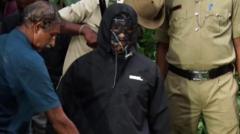Police in Dharmasthala, a small but significant religious town in Karnataka, have arrested a former temple cleaner for allegedly lying about his claims that he buried the bodies of women who had been raped and murdered. The startling allegations had already ignited a firestorm of controversy within the community and beyond.
The man, whose identity has been obscured for safety reasons, made his claims public earlier in July while filing a police report and addressing a magistrate. His accusations suggested he had buried hundreds of victims, some minors, from 1995 to 2014 when he worked at the local temple dedicated to Manjunatha Swamy, a revered deity in Hinduism.
According to sources within the Special Investigation Team (SIT) assigned to the case, the man was arrested for perjury after he produced a skull claiming it belonged to one of the buried bodies, despite evidence disputing his account. The SIT has since located human remains, including a skull and several bone fragments, at locations he indicated, requiring forensic analysis to determine their origins.
The shocking claims have thrust Dharmasthala into the national spotlight, prompting widespread media attention and public outcry. The temple’s chief administrator, Veerendra Heggade, publicly dismissed the allegations, stating they were "false and baseless," and expressed support for the ongoing investigations.
The local political landscape has also been shaken, with discussions erupting in the state assembly over the implications of these allegations against a site cherished by millions. Home Minister G Parameshwara emphasized that the truth should be uncovered, indicating that the results, whether substantiated or not, would impact the region's reputation.
The situation continues to unfold in a web of community tension and political drama, underscoring the complex intersection of faith, justice, and societal responsibility in addressing such grave accusations in India.























